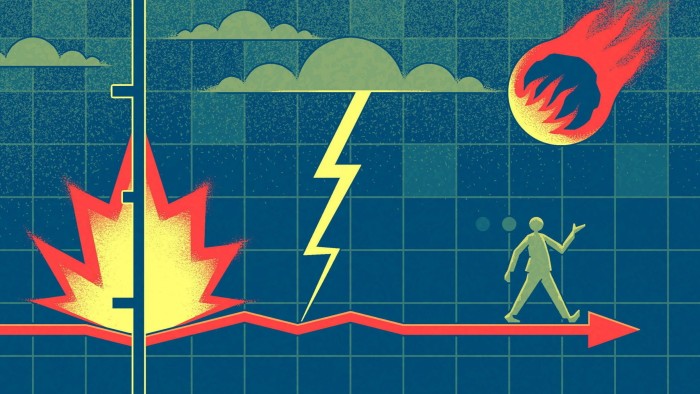[ad_1]
Stay informed with free updates
Simply sign up to the US equities myFT Digest — delivered directly to your inbox.
The writer is chair of Rockefeller International. His latest book is ‘What Went Wrong With Capitalism’
It’s suddenly fashionable to talk about how the era of “American exceptionalism” is ending, given Trump’s policies, the dollar’s decline, and the fact that so far this year the US stock market is underperforming its international rivals by the widest margin since 1987.
The surprise, however, is that despite the shocks emanating from Washington and the Middle East, US stocks are still grinding higher. And so are US bond prices, despite the exploding US deficit. American market performance is less exceptional because the rest of the world is rising, not because the US is declining.
Many dismiss this resilience as mindless optimism and argue that US stocks will soon succumb to the “gloomcycle” of 2025. But in my experience, when the disconnect between commentators and markets is this wide, the message from the markets is usually more correct. So, it’s worth trying to figure out what the markets may be sensing.
US stocks seem to be floating along at historically high valuations on data continuing to show that Trump’s policies have yet to impact inflation or growth in any meaningful way. The big fear was that his ever-evolving tariffs would drive up inflation and slow growth. Instead, inflation has remained lower and growth higher than the consensus forecasts. Tariff revenue is starting to show up in the Treasury coffers but not much in consumer prices, for reasons that are a bit mysterious; are foreign suppliers absorbing the costs, or maybe US firms are running down existing inventory?
One way or another, US corporations have yet to suffer a significant hit to earnings. Most forecasters are still calling for earnings growth to slow (to under 8 per cent), inflation to rise (to around 3 per cent) and GDP growth to fall (to around 1.5 per cent) by the second half of this year. But the market is brushing off these projections, too.
US corporations are buying back their own stock at a near-record pace of $4bn a day. American retail investors are all in, buying at an unusually aggressive pace this year. Roughly half of US household wealth is now invested in stocks — breaking the record set during the dotcom bubble of 2000. Though small investors are often said to represent “dumb money,” their faith is paying off so far. To the old line — never bet against the US consumer — might be added a new twist. Never bet against the US retail investor.
Meanwhile foreigners are not staging a significant retreat from US stocks or bonds despite being under threat from new taxes on remittances and foreign investment, deportations, and more. This is starting to look like a marriage that survives on inertia and fear of what might come with change.
As in past bear markets, including the one in the 2000s, the decline of the dollar in recent months has been seen as an orderly adjustment after a long period of overvaluation — not as a sign that America is having trouble funding its large deficits.
Had it been clear last year that instead of falling as expected, US deficits would continue trending up towards a new peak — possibly close to 7 per cent of GDP — most analysts would have predicted a bond market riot. Instead, the response has been muted, with bond yields declining marginally this year.
To most observers, the Trump presidency has brought previously unimaginable tumult, even threatening to alter the basic idea of America and its place in the world. But the stock market is behaving as if nothing has changed. The same internal trends that were dominating last year are in play.
The AI mania has reached new heights with a US-led basket of AI stocks breaking out to all-time highs. The budding narrative at the start of the year, that the US was losing its lead to Chinese rivals like DeepSeek, has faded and analysts are again talking up America’s advantages. Americans appear to be adopting AI faster than they adopted digital technologies of the past, including the internet itself. US firms are deploying it faster than their foreign counterparts, including even those in China. Of the world’s top 10 AI platforms by number of users, eight are American, led by ChatGPT.
The top five US tech firms continue to dominate and still account for nearly 30 per cent of the US stock market’s value. Meanwhile small and mid-cap US stocks continue to lag behind as they have for years, only now under a leader who promised to help those businesses.
To the market optimists, AI promises a productivity miracle that could boost US economic growth and save it from its rising deficits and debt. They look to this rosy future, not to the talk of economic trouble to come later this year.
There are however three ways this buoyancy might break: the AI narrative shifts again, given that companies are investing hundreds of billions of dollars in AI infrastructure, without quite knowing who will profit, or when. Economists prove uncharacteristically more right than the market about the threat of lower growth and higher inflation from tariffs. Or investors come to realise that the apparent strength of US consumers and corporations is a mirage — the flip side of the massive and rising US government deficit.
Until one of those scenarios plays out, the US markets are likely to continue shrugging off the gloomcycle — and encouraging Trump to believe he is winning.
[ad_2]
Source link

